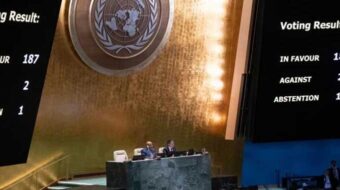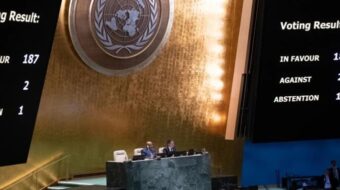The U.S. government’s assault on Cuba’s sovereignty continues. An economic blockade remains in force after a half century. Cuba is designated a terrorist state. The Cuban Five political prisoners still are not free. Now a report from the U.S. General Accounting Office reveals that monies for projects directed at changing Cuba’s government increased sharply after 2004, the George W. Bush administration, and have remained high during the Obama administration.
Between 1996 and 2011, Congress appropriated $205 million to enable the United States Agency for International Development (USAID) and the State Department to carry out so-called “democracy promotion” programs in Cuba. According to the 58-page report issued on February 7, 2013, 90 percent of the total was dispensed between 2004 and 2011 and half of that was spent during Obama’s first term.
The GAO was responding to a request in September 2011 from then-Sen. John Kerry, chairperson of the Senate Foreign Relations Committee. Kerry, now Secretary of State, was seeking follow-up on problems the GAO identified in 2006 and 2008. It had been established that organizations administering the interventionist Cuba programs were holding onto large amounts of money and providing luxury items for their Cuban contacts. In 2011, Kerry ordered a brief freeze on $20 million heading for USAID and State Department Cuba projects.
The GAO’s overall judgment was that, “USAID’s program is improved, but State [Department] could better monitor its implementing partners.” Emphasizing reduction of hazards to U.S. funded operatives, the report observes that, “Conditions in Cuba pose security risks to the implementing partners.” The GAO attributes “surveillance, arbitrary arrests, detentions, travel restrictions, exile, [and] criminal prosecutions” on the part of Cuban authorities to government repression. There is silence on the fact that Cuba, like other nations, has laws criminalizing anti-government actions undertaken at the behest of hostile foreign nations.
One object lesson the report highlights is the example of Alan Gross, the highly paid USAID “sub-partner” who handed out sophisticated communications equipment and is now imprisoned in Cuba. Imprisonment in 2003 of U.S. – paid anti-government pseudo-journalists and librarians, not mentioned, may have served as another cautionary tale.
The GAO reports that now for the sake of risk reduction, 90 percent of USAID and State Department Cuba funding for Cuba programs goes to “for – profit and nongovernmental organizations with a worldwide or regional focus” and very little to groups working exclusively in Cuba. In addition, “Cuba democracy assistance efforts have expanded beyond a focus on traditional activists to include groups such as poor and rural communities, religious organizations, small businesses, and information technology enthusiasts.” Support has increased for independent bloggers, social networking, and for developing information technology.
The GAO report released to the public refers to an earlier, “sensitive but unclassified” version that touches upon funding recipients. Yet even there, says the Miami Herald, the “USAID does not release the names of most of its partners and sub- partners [so as] to protect them from Cuban authorities.” The Herald applauds the GAO’s “exhaustive review.” USAID spokesperson Mark Lopes is quoted: “Our Cuba democracy programs are comparable to what we and other donors do to support people in repressive societies all over the world.”
On March 14 the Cuban Foreign Ministry responded to the report by denouncing U.S. funding as “destined to promote the overthrow of the Cuban government.” The Ministry took occasion to protest other instances of U.S. funding for “regime change” not covered in the report, particularly the $30 million in annual U.S. funding for Radio and TV Marti broadcasts to the island and support for intelligence agencies operating in Cuba.
The Ministry’s statement views the U.S. government’s move of diversifying anti-Cuba funding away from contracting groups focused solely on Cuba as an attempt to avoid “corruption that has predominated over the years with [money] serving to fatten the pockets of the most recalcitrant ultra-right wingers in Miami.” Leaving recipients unidentified is in line with the “covert nature” of the projects and “execution beyond the reach of Cuban laws.” “Other official documents that have come to light” suggest to the Foreign Ministry that the “new sectors of Cuban society” targeted by U.S. interventionists include “Blacks, homosexuals, professionals, intellectuals, and artists.”
The statement concludes: “The GOA document is extremely revealing as to the firm imprint of the Obama administration on those policies and of the strong impulse it provides for them. The administration’s purpose is to perfect their design, disguise them better, and make it more difficult for Cuba’s institutions and legal system to detect and neutralize them.”












Comments